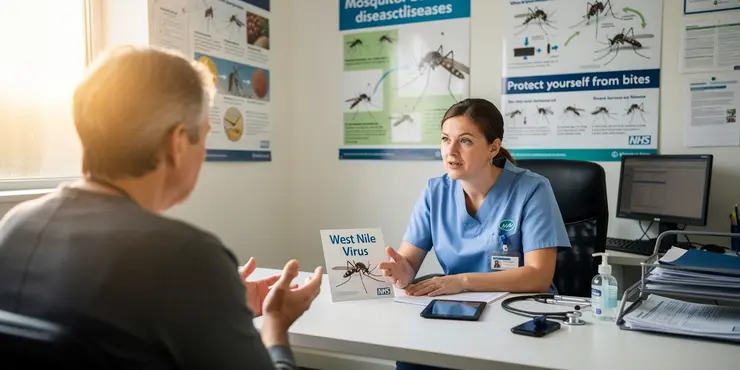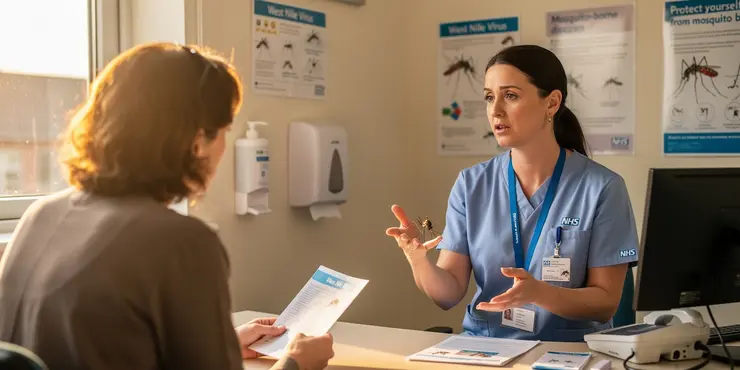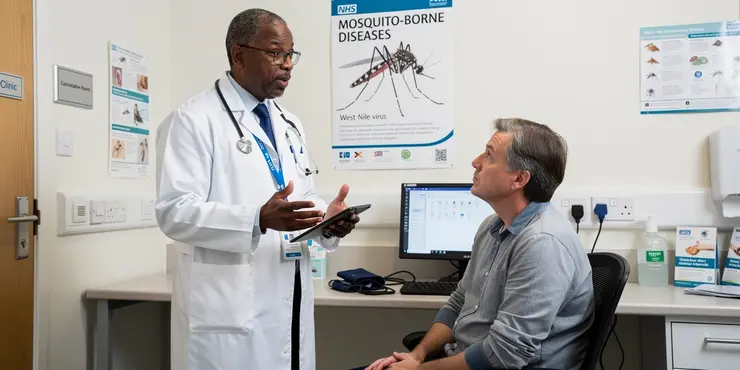
Find Help
More Items From Ergsy search
-

Is there a test for West Nile Virus?
Relevance: 100%
-

What is West Nile Virus?
Relevance: 87%
-

What is West Nile Virus?
Relevance: 85%
-

Is there a vaccine for West Nile Virus?
Relevance: 85%
-

Are there treatments for West Nile Virus?
Relevance: 83%
-

How is West Nile Virus transmitted?
Relevance: 81%
-

What are the symptoms of West Nile Virus?
Relevance: 81%
-

How prevalent is West Nile virus in the UK?
Relevance: 81%
-

How do health officials monitor West Nile Virus?
Relevance: 80%
-

Which countries are affected by West Nile Virus?
Relevance: 80%
-

Can pets get West Nile Virus?
Relevance: 79%
-

What should I do if I think I have West Nile Virus?
Relevance: 79%
-

Who is at risk for severe illness from West Nile Virus?
Relevance: 74%
-

What other viruses are tested for in blood donations?
Relevance: 57%
-

How can West Nile Virus be prevented?
Relevance: 53%
-

Can mosquitoes carrying West Nile Virus be controlled?
Relevance: 52%
-

Can you get West Nile Virus more than once?
Relevance: 49%
-

Are UK mosquitoes capable of transmitting Zika virus?
Relevance: 37%
-

What diseases are spread by mosquitos in the UK in 2025?
Relevance: 34%
-

When is West Nile Virus most active?
Relevance: 34%
-

What is the Ebola virus?
Relevance: 30%
-

Is the Marburg virus related to the Ebola virus?
Relevance: 30%
-

Can West Nile Virus be transmitted from person to person?
Relevance: 30%
-

How is Nipah Virus diagnosed?
Relevance: 26%
-

Can West Nile Virus spread through blood transfusions or organ transplants?
Relevance: 26%
-
Do all mosquitoes in the UK carry diseases?
Relevance: 26%
-

How is Marburg virus disease diagnosed?
Relevance: 26%
-

How is Chikungunya virus infection diagnosed?
Relevance: 25%
-

What is the Marburg Virus?
Relevance: 24%
-

Is there a vaccine for the Zika virus?
Relevance: 24%
-

Is there a vaccine for Marburg virus?
Relevance: 24%
-

What are the symptoms of Zika virus?
Relevance: 24%
-

What research is being done on the Marburg virus?
Relevance: 23%
-
Do new variants affect COVID-19 testing?
Relevance: 23%
-

What regions of the UK are most affected by mosquito-borne diseases?
Relevance: 23%
-

Is Zika virus present in the UK?
Relevance: 23%
-

How do health authorities confirm a Marburg virus outbreak?
Relevance: 23%
-

West Midlands LEHN Animated Video on Eye Health
Relevance: 22%
-

What is Nipah Virus?
Relevance: 22%
-

Can men in the UK transmit Zika virus if infected?
Relevance: 22%
Introduction to West Nile Virus Testing
West Nile Virus (WNV) is a mosquito-borne infection that can lead to neurological diseases in humans. While commonly found in regions with warmer climates, the virus has been increasingly monitored in areas like the United Kingdom due to international travel and climate changes. Identifying the presence of West Nile Virus in humans and potentially in vectors is crucial to preventing outbreaks and managing public health risk. In the UK, testing for WNV is part of public health strategies, particularly for those who show symptoms or have traveled to endemic areas.
Types of Tests for West Nile Virus
There are several methods available for testing West Nile Virus in humans, each serving different purposes. The two primary types of tests used are molecular tests and serological tests. Molecular tests generally detect the presence of WNV RNA and are most effective when performed soon after the onset of symptoms. This is because the level of viral RNA declines as the immune response kicks in. The most common molecular test for WNV is the polymerase chain reaction (PCR) test, which is highly sensitive and specific.
Serological tests, on the other hand, are designed to detect antibodies to the virus in the blood. These antibodies are produced as part of the body's immune response to infection. Enzyme-linked immunosorbent assay (ELISA) is a common serological test that identifies Immunoglobulin M (IgM) antibodies, indicating a recent infection. Immunoglobulin G (IgG) can also be tested to assess past exposure or infection history. While serological tests can provide evidence of infection, they occasionally cross-react with antibodies from other viruses, requiring confirmatory tests for precise diagnosis.
Procedure and Availability in the UK
In the UK, WNV testing is primarily coordinated through healthcare providers and public health laboratories. Individuals who present symptoms like fever, headache, body aches, or more severe neurological symptoms after traveling to areas with known WNV activity may be recommended to get tested. Healthcare providers assess the need for testing based on clinical evaluation and exposure risk. The testing process typically involves collecting a blood sample, which is then processed in a specialized laboratory equipped to handle virological analyses.
Public Health Implications
Testing for West Nile Virus is not just crucial for individual diagnosis and treatment but also serves a significant public health role. Identifying cases of WNV can help trace the spread of the virus and inform preventive measures. The UK's surveillance efforts include monitoring bird and mosquito populations for WNV. Human testing data can contribute to these surveillance programs by indicating if the virus has reached local transmission levels, aiding in vector control strategies and public education campaigns.
Conclusion
While West Nile Virus remains relatively rare in the UK, the presence of testing and surveillance systems ensures that the country is prepared to handle potential cases that arise due to travel or climate changes increasing vector presence. Through precise testing methods like PCR and ELISA, healthcare providers can effectively manage and mitigate the risks associated with WNV infection.
Introduction to West Nile Virus Testing
West Nile Virus (WNV) is a virus spread by mosquitoes. It can make people very sick. The virus is often found in warmer places, but because people travel a lot and the weather is changing, it can also be in places like the UK. Testing for the virus is important to keep people safe and healthy. In the UK, doctors might test for the virus if someone feels sick or has been to places where the virus is common.
Types of Tests for West Nile Virus
There are different ways to test for West Nile Virus in people. Two main types of tests are used: molecular tests and serological tests.
Molecular tests look for the virus itself in the body. These tests work best soon after a person starts feeling sick. The PCR test is a common molecular test. It is very good at finding the virus.
Serological tests check for special proteins called antibodies in the blood. These antibodies show that the body is fighting the virus. One common test is called ELISA. It looks for two types of antibodies, IgM and IgG, to see if someone has or had the virus. Sometimes these tests can mix up antibodies from other viruses, so doctors may need to do more tests to be sure.
Procedure and Availability in the UK
In the UK, tests for West Nile Virus are done by doctors and special health labs. If someone has symptoms like fever, headache, or body aches after going to a place with West Nile Virus, they might need a test. Doctors decide if a test is needed based on how the person feels and where they have been. To do the test, a small amount of blood is taken from the person and checked in a lab.
Public Health Implications
Testing for West Nile Virus is not only important for helping sick people but also for keeping everyone safe. Finding cases of the virus helps track its spread and inform safety measures. In the UK, health teams watch birds and mosquitoes to see if they have the virus. Testing people helps show if the virus is spreading among local mosquitoes or people. This information helps with bug control and teaching people how to stay safe.
Conclusion
Although West Nile Virus is rare in the UK, the country is ready to handle it if it appears. Testing methods like PCR and ELISA help doctors find and manage infections. These preparations help keep people healthy even if the virus comes because of travel or changing weather.
Frequently Asked Questions
What is West Nile Virus?
West Nile Virus (WNV) is a mosquito-borne virus that can cause febrile illness, encephalitis, or meningitis. It is commonly found in Africa, Europe, the Middle East, North America, and West Asia.
How is West Nile Virus transmitted?
West Nile Virus is primarily transmitted to humans through the bite of an infected mosquito. It can also be transmitted through blood transfusions, organ transplants, and from mother to baby during pregnancy, delivery, or breastfeeding.
What are the symptoms of West Nile Virus?
Most people infected with WNV do not develop symptoms. For those who become symptomatic, symptoms can include fever, headache, body aches, joint pains, vomiting, diarrhea, or rash. Severe cases may result in neurologic diseases such as encephalitis or meningitis.
Is there a test for West Nile Virus?
Yes, there are several tests available to diagnose West Nile Virus. These tests include serological tests to detect antibodies and polymerase chain reaction (PCR) tests to detect the virus's genetic material.
What types of tests are used to diagnose West Nile Virus?
The most common tests are serological tests that detect antibodies produced in response to the virus, such as IgM antibody capture enzyme-linked immunosorbent assay (MAC-ELISA). PCR tests can also detect viral genetic material.
How accurate are the tests for West Nile Virus?
Tests for West Nile Virus are generally accurate, especially when the patient's symptoms and timing of illness are considered. However, no test is perfect, and false positives or negatives can occur.
When should I get tested for West Nile Virus?
You should consider getting tested if you have symptoms consistent with West Nile Virus, especially if you live in or have traveled to an area where the virus is known to be present.
Can I get tested for West Nile Virus at my doctor's office?
Most doctors can order tests for West Nile Virus, but the actual testing is usually conducted at specialized laboratories.
How long does it take to get the results of a West Nile Virus test?
The time it takes to get results can vary depending on the laboratory and the specific test used. It usually takes a few days to a week.
Can blood tests for West Nile Virus be done at any time?
Blood tests are most effective when conducted within the first few weeks after the onset of symptoms, as this is when the body's immune response is most active.
What should I do if my West Nile Virus test is positive?
If your test is positive, you should consult with your healthcare provider for advice and potential management of symptoms. Supportive care is often the primary treatment.
Can you test for West Nile Virus if you are asymptomatic?
Testing for West Nile Virus in asymptomatic individuals is generally not recommended, as most people do not develop illness.
Are there follow-up tests if I test positive for West Nile Virus?
Follow-up tests may be performed depending on your symptoms and the severity of the illness, as advised by your healthcare provider.
Is testing for West Nile Virus covered by insurance?
Coverage for West Nile Virus testing varies by insurance provider. It's best to check with your insurance to determine coverage specifics.
Can children be tested for West Nile Virus?
Yes, children can be tested for West Nile Virus if they have symptoms and there is a reason to suspect infection.
How is a West Nile Virus test performed?
The test typically involves drawing a blood sample or, in some cases, collecting a cerebrospinal fluid sample for testing.
Is there a specific season when West Nile Virus testing is more common?
West Nile Virus testing may be more common during warmer months when mosquitoes are active, typically from late spring to early fall.
Can West Nile Virus be prevented?
Preventative measures include using insect repellent, wearing protective clothing, and eliminating standing water where mosquitoes breed.
Do all laboratories perform West Nile Virus testing?
Not all laboratories perform West Nile Virus testing. Tests are usually handled by specialized laboratories with the necessary equipment and expertise.
Who should consider getting tested for West Nile Virus?
Individuals with symptoms consistent with West Nile Virus and a history of potential exposure, such as recent mosquito bites in an endemic area, should consider testing after consulting with a healthcare provider.
What is West Nile Virus?
West Nile Virus is a sickness that people can get from mosquito bites.
To stay safe, use bug spray and wear long clothes outside. You can also use mosquito nets over beds.
West Nile Virus (WNV) is a virus that mosquitoes spread. It can make people sick with a fever, or affect the brain and spinal cord. This virus is found in places like Africa, Europe, the Middle East, North America, and West Asia.
You can stay safe from West Nile Virus by using bug spray, wearing long clothes, and staying inside when mosquitoes are around. Check out apps or alarms to remind you to use bug spray.
How do you get West Nile Virus?
People can get West Nile Virus from a mosquito bite. If the mosquito has the virus, it can pass it on when it bites. Other ways to get the virus are from blood donations, organ transplants, and from a mom to her baby when she is pregnant, giving birth, or breastfeeding.
What happens when someone has West Nile Virus?
Here are things to look out for:
- Feeling like you have the flu (fever, tiredness, headache).
- Sometimes your body can ache, or your neck can feel stiff.
- Some people might feel sick to their stomach or throw up.
- It could also be hard to see or think clearly.
Helpful tools:
- Ask a grown-up to help you read or explain the words to you.
- Use pictures or drawings to understand better.
- You can use a computer or tablet to listen to this information.
Most people who get the West Nile Virus (WNV) do not feel sick. If they do get sick, they might have:
- Fever (feel hot)
- Headache (head hurts)
- Body aches (body hurts)
- Joint pains (joints hurt)
- Vomiting (throwing up)
- Diarrhea (runny tummy)
- Rash (spots on skin)
If it gets very bad, WNV can affect the brain. This can cause diseases like encephalitis or meningitis. These are big words for serious brain problems.
If you need help understanding, you can:
- Ask someone to explain.
- Use a dictionary to learn new words.
- Look at pictures to help.
Can you get a test for West Nile Virus?
Yes, you can get a test to see if you have West Nile Virus. A doctor can do a blood test or a test of the liquid around your brain. These tests will help find out if you have the virus.
Here are some things that can help you:
- Ask a family member or friend to go with you to the doctor.
- Bring a notebook to write down what the doctor says.
- Use pictures or drawings to help you understand.
Yes, doctors can do tests to find out if someone has West Nile Virus. These tests look for signs of the virus in your body.
There are tests that check for special proteins called antibodies. These mean your body is fighting the virus.
There are also tests called PCR tests. They look for the virus's tiny pieces of code, like its special recipe.
If you need help understanding or remembering this, you can ask someone to explain it to you. You can also use pictures or videos to help make it clearer.
How do doctors find out if someone has West Nile Virus?
The most common tests are blood tests. These tests look for antibodies. Antibodies are what your body makes to fight a virus. One of these tests is called MAC-ELISA. There are also PCR tests. These tests look for the virus's DNA.
How good are the tests for West Nile Virus?
Tests for West Nile Virus work well most of the time, especially if we know the person's symptoms and when they got sick. But no test is perfect, and sometimes the test can say you have the virus when you don't, or say you don't have it when you do.
When should I get tested for West Nile Virus?
You should get a test if you feel sick. Here are some signs to look for:
- Fever - You feel very hot.
- Headache - Your head hurts.
- Tiredness - You feel very sleepy and weak.
- Body aches - Your muscles hurt.
If you have these signs, tell an adult or a doctor. They can help you get a test.
You can also use tools like pictures or cards to show how you feel. This can help people know if you need a test.
You should get a test if you have signs of West Nile Virus. This is important if you live or went to a place where the virus is found.
Can my doctor check me for West Nile Virus?
Ask your doctor if they can do a test to check for West Nile Virus. They might take a blood sample. If they can't do the test, they can tell you where to go for help.
If reading is hard, ask someone to read with you or use a tool that reads text out loud. It's okay to ask questions until you understand.
Most doctors can ask for tests to check for West Nile Virus. But the testing is usually done at special labs.
How long will I wait to get my West Nile Virus test results?
It can take a few days or up to two weeks to get your test results. You can ask the doctor or nurse how long you will wait. They will help you understand.
Here are some helpful tips:
- Use a calendar to mark the days until you get your results.
- Ask someone you trust to remind you or go with you to get the results.
- Spend time doing fun activities while you wait to help keep your mind busy.
Getting test results can take a different amount of time. It depends on the lab and the kind of test. Most times, it takes a few days to one week.
For help understanding test results, you can ask a friend, family member, or doctor to explain. Using a calendar to mark expected dates for test results can help you keep track.
Can you have a blood test for West Nile Virus at any time?
You can have a blood test whenever you need it. The test checks for West Nile Virus in your blood.
If you want to know more, ask your doctor.
Using pictures or talking to someone can help you understand better.
Blood tests work best when done in the first few weeks after symptoms start. This is when your body's defense system is most active.
Support tools like talking to your doctor, or using pictures and videos can help you understand more.
What to do if your West Nile Virus test is positive
If your test says you are sick, talk to your doctor. They can tell you what to do next. Your doctor can help you feel better.
Can you get tested for West Nile Virus if you do not feel sick?
Doctors do not usually test for West Nile Virus if you do not feel sick. Most people do not get sick from it.
If I have West Nile Virus, will I need more tests?
Your doctor might do more tests if you are feeling sick. They will decide what tests you need based on how you're feeling and how serious your illness is.
Does my insurance pay for West Nile Virus test?
Each insurance company is different when it comes to paying for West Nile Virus tests. Ask your insurance company what they will pay for.
Can doctors check if kids have West Nile Virus?
Yes, doctors can do tests to find out if kids have West Nile Virus. If a kid feels sick, they should see a doctor.
Doctors might take a small blood sample to do the test. It does not hurt much, like a tiny prick.
If you're curious or worried, you can ask a doctor or nurse to explain. They can use simple words and pictures.
It's good to know about tools that help learning, like storybooks or videos, which can make things easier to understand.
Yes, children can be tested for West Nile Virus. They may need a test if they are feeling sick and there is a reason to think they might have the virus.
Helpful Tips:
- Ask Questions: If you have questions, ask a doctor or nurse.
- Use Pictures: Look at pictures or videos to understand more.
- Talk Together: Talk to someone you trust to help you understand.
How do doctors test for West Nile Virus?
Doctors check for West Nile Virus with a blood test or a spinal fluid test.
They take a small amount of blood from your arm.
Sometimes, they take fluid from your back.
This helps them see if the virus is in your body.
Using a picture chart can help you understand the steps.
Ask a friend or family member to explain if you need help.
The test usually means taking a small amount of blood. Sometimes, it might mean taking a sample of the fluid around the brain and spine. This is to check for health problems.
When do people test for West Nile Virus most often?
We usually test for West Nile Virus when it's warm outside. This is because mosquitoes come out more when it's warm. They are usually around from the end of spring to the start of fall.
Can we stop people from getting West Nile Virus?
Yes, we can try to stop people from getting West Nile Virus.
Here are some ways to help:
- Use bug spray to keep mosquitoes away.
- Stay indoors at dusk and dawn when mosquitoes are most active.
- Wear long sleeves and pants to protect your skin from bites.
- Make sure windows and doors have screens to keep mosquitoes out of the house.
If you need help, ask an adult to show you how to use these tips.
Here are some ways to stop mosquito bites:
- Use bug spray to keep mosquitoes away.
- Wear clothes that cover your skin.
- Get rid of water outside where mosquitoes can lay eggs.
Tools that might help:
- Use simple bug sprays you can buy at the store.
- Wear long sleeves and pants.
- Ask someone to help you find and empty pots or places with rainwater.
Can every lab test for West Nile Virus?
Not every lab can test for West Nile Virus. Special labs with the right tools and experts do these tests.
Who should think about getting a test for West Nile Virus?
If you feel sick, tell a grown-up or see a doctor. They can help you find out if you need the test for West Nile Virus.
People might need a test if they have:
- A fever
- A headache
- Muscle aches
- Been bitten by lots of mosquitoes
It's good to talk with a doctor if you're worried. They know how to help.
Helpful tools:
- Ask a doctor or nurse
- Use picture books to learn
- Ask a friend or family member to help understand
If you have signs that might mean you have West Nile Virus, and you've been bitten by mosquitoes in a place where the virus is common, talk to a doctor. The doctor can help you decide if you need a test.
Useful Links
This website offers general information and is not a substitute for professional advice.
Always seek guidance from qualified professionals.
If you have any medical concerns or need urgent help, contact a healthcare professional or emergency services immediately.
Some of this content was generated with AI assistance. We’ve done our best to keep it accurate, helpful, and human-friendly.
- Ergsy carfully checks the information in the videos we provide here.
- Videos shown by Youtube after a video has completed, have NOT been reviewed by ERGSY.
- To view, click the arrow in centre of video.
- Most of the videos you find here will have subtitles and/or closed captions available.
- You may need to turn these on, and choose your preferred language.
- Go to the video you'd like to watch.
- If closed captions (CC) are available, settings will be visible on the bottom right of the video player.
- To turn on Captions, click settings .
- To turn off Captions, click settings again.
More Items From Ergsy search
-

Is there a test for West Nile Virus?
Relevance: 100%
-

What is West Nile Virus?
Relevance: 87%
-

What is West Nile Virus?
Relevance: 85%
-

Is there a vaccine for West Nile Virus?
Relevance: 85%
-

Are there treatments for West Nile Virus?
Relevance: 83%
-

How is West Nile Virus transmitted?
Relevance: 81%
-

What are the symptoms of West Nile Virus?
Relevance: 81%
-

How prevalent is West Nile virus in the UK?
Relevance: 81%
-

How do health officials monitor West Nile Virus?
Relevance: 80%
-

Which countries are affected by West Nile Virus?
Relevance: 80%
-

Can pets get West Nile Virus?
Relevance: 79%
-

What should I do if I think I have West Nile Virus?
Relevance: 79%
-

Who is at risk for severe illness from West Nile Virus?
Relevance: 74%
-

What other viruses are tested for in blood donations?
Relevance: 57%
-

How can West Nile Virus be prevented?
Relevance: 53%
-

Can mosquitoes carrying West Nile Virus be controlled?
Relevance: 52%
-

Can you get West Nile Virus more than once?
Relevance: 49%
-

Are UK mosquitoes capable of transmitting Zika virus?
Relevance: 37%
-

What diseases are spread by mosquitos in the UK in 2025?
Relevance: 34%
-

When is West Nile Virus most active?
Relevance: 34%
-

What is the Ebola virus?
Relevance: 30%
-

Is the Marburg virus related to the Ebola virus?
Relevance: 30%
-

Can West Nile Virus be transmitted from person to person?
Relevance: 30%
-

How is Nipah Virus diagnosed?
Relevance: 26%
-

Can West Nile Virus spread through blood transfusions or organ transplants?
Relevance: 26%
-
Do all mosquitoes in the UK carry diseases?
Relevance: 26%
-

How is Marburg virus disease diagnosed?
Relevance: 26%
-

How is Chikungunya virus infection diagnosed?
Relevance: 25%
-

What is the Marburg Virus?
Relevance: 24%
-

Is there a vaccine for the Zika virus?
Relevance: 24%
-

Is there a vaccine for Marburg virus?
Relevance: 24%
-

What are the symptoms of Zika virus?
Relevance: 24%
-

What research is being done on the Marburg virus?
Relevance: 23%
-
Do new variants affect COVID-19 testing?
Relevance: 23%
-

What regions of the UK are most affected by mosquito-borne diseases?
Relevance: 23%
-

Is Zika virus present in the UK?
Relevance: 23%
-

How do health authorities confirm a Marburg virus outbreak?
Relevance: 23%
-

West Midlands LEHN Animated Video on Eye Health
Relevance: 22%
-

What is Nipah Virus?
Relevance: 22%
-

Can men in the UK transmit Zika virus if infected?
Relevance: 22%


